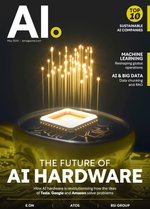Revolutionising Organisations Globally with Machine Learning

The integration of machine learning (ML) into various sectors has ushered in a new wave of innovation, revolutionising the way businesses operate and individuals interact with technology. From personalised recommendations on streaming platforms to predictive maintenance in manufacturing, ML applications have become ubiquitous, promising efficiency, accuracy and unprecedented insights. As AI continues to evolve, the synergy between machine learning algorithms and real-world applications is reshaping industries at an unprecedented pace.
The global machine learning market was valued at US$19.45bn in 2022 and is projected to reach US$188.34bn by 2030, growing at a CAGR of 37.47% from 2023 to 2030. This exponential growth highlights the increasing adoption of ML technologies.
Machine learning has transcended traditional boundaries, empowering organisations to unlock valuable insights from vast datasets. Whether it's enhancing customer experiences through personalised recommendations or optimising supply chain operations, ML is driving tangible value across industries.
Machine learning revolutionising healthcare
In healthcare, machine learning algorithms are revolutionising patient care, diagnosis and treatment strategies. By leveraging ML algorithms, healthcare providers can analyse medical images with unparalleled accuracy, facilitating early detection of diseases such as cancer and expediting treatment decisions.
At Carnegie Mellon University in the US, Sridhar Tayur, the Ford Distinguished Research Chair, and his team have spearheaded innovative research in applying machine learning to healthcare diagnostics. Their recent study focuses on leveraging advanced classification techniques, such as support vector machines, in conjunction with quantum-inspired computing to enhance the diagnosis of pneumonia – a condition notorious for its impact on respiratory health and mortality rates, particularly among children under the age of five.
“Machine learning is used for prediction and in healthcare we want to predict if somebody has a disease or not,” he says. Through their investigation, Tayur and his colleagues demonstrated the effectiveness of their approach, noting that it yields fewer errors and expedites the diagnostic process compared to traditional methods. This breakthrough has the potential to revolutionise pneumonia detection by harnessing the power of machine learning algorithms to analyse chest X-rays and identify patterns indicative of the infection.
Moreover, predictive analytics powered by ML are enabling healthcare organisations to forecast patient admissions, optimise resource allocation, and improve operational efficiency. Machine learning algorithms can analyse vast volumes of patient data to predict disease outbreaks, optimise hospital workflows and ultimately save lives.
Empowering financial services
In the financial services sector, machine learning is reshaping how institutions approach risk management, fraud detection and customer engagement. By employing advanced ML models, financial institutions can detect fraudulent activities in real time, safeguarding against cyber threats and protecting consumer assets.
Furthermore, ML-driven algorithms are revolutionising investment strategies, enabling asset managers to identify lucrative opportunities and mitigate market risks. Machine learning algorithms analyse market trends, consumer behaviour, and economic indicators to generate actionable insights, empowering investors to make informed decisions.
According to the Bank of England, the number of UK financial services firms that use machine learning continues to increase. Overall, 72% of firms that responded to its machine learning survey are using or developing ML applications. These applications are becoming increasingly widespread across more business areas.
The Governor of the Bank of England, Andrew Bailey, says: “AI is something that I think we have to embrace with our eyes open. It is very important and has potentially profound implications for economic growth, productivity and how economies are shaped going forward.”
Transforming retail experiences
In the retail sector, machine learning algorithms are reshaping the customer experience, from personalised recommendations to demand forecasting. By leveraging ML algorithms, retailers can analyse consumer preferences, purchase history and browsing behaviour to deliver personalised shopping experiences, driving customer loyalty and sales.
Moreover, ML-driven demand forecasting models enable retailers to optimise inventory management, reduce stockouts, and minimise overstocking. Machine learning algorithms analyse diverse data sources, including sales data, social media trends and macroeconomic indicators, to forecast demand with precision, enabling retailers to optimise their supply chain operations and enhance profitability.
Leon Gordon, a renowned expert in data analytics and artificial intelligence and CEO of Onyx Data, says: “The ability to scale is extremely important in retail. It allows businesses to keep up with rapid demand and momentum, especially during massive spikes in user traffic around holidays and sales days, without compromising on quality or efficiency.”
Retail giant Marks & Spencer has a system that can handle the ebbs and flows of customer sales and meet customer traffic without disruptions in customer service. Marks & Spencer has more than 30 million customers and large amounts of data that require systems that can scale to process it. The company uses Azure Machine Learning to build machine learning solutions that can scale and give customers personalised offers. This is just one example of how machine learning is being utilised in retail.
Looking ahead: The future of machine learning
As machine learning continues to advance, its transformative potential across industries is boundless. From healthcare and finance to retail and beyond, ML-driven solutions are driving innovation, efficiency, and value creation. However, with great power comes great responsibility. As we embrace the potential of machine learning, it's imperative to prioritise ethical considerations, transparency and accountability to ensure that AI technologies benefit society as a whole.
The fusion of machine learning with real-world applications is causing a shift, redefining the possibilities of AI and shaping the future of industries worldwide. As organisations harness the power of machine learning to unlock insights, optimise operations and drive innovation, the journey towards AI-driven transformation continues to unfold, promising a future where intelligent technologies empower humanity to achieve greater heights.
******
Make sure you check out the latest edition of AI Magazine and also sign up to our global conference series - Tech & AI LIVE 2024
******
AI Magazine is a BizClik brand

